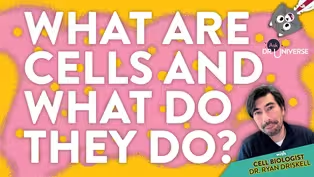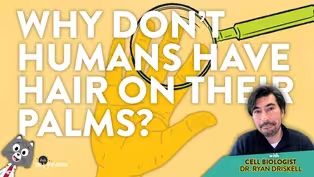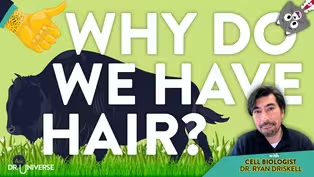Ask Dr. Universe
Ask Dr. Universe: Meet A Cell Biologist
Special | 9m 51sVideo has Closed Captions
Dr. Universe interviews cell biologist Dr. Ryan Driskell from WSU
In this episode of Ask Dr. Universe: Meet The Scientists, Dr. Universe interviews cell biologist Dr. Ryan Driskell, an associate professor from the School of Molecular Biosciences at Washington State University. The pair talk about what exactly a cell biologist does, how Dr. Driskell became interested in the field, other biology jobs and of course, answers a few science questions along the way.
Problems playing video? | Closed Captioning Feedback
Problems playing video? | Closed Captioning Feedback
Ask Dr. Universe is a local public television program presented by NWPB
Ask Dr. Universe
Ask Dr. Universe: Meet A Cell Biologist
Special | 9m 51sVideo has Closed Captions
In this episode of Ask Dr. Universe: Meet The Scientists, Dr. Universe interviews cell biologist Dr. Ryan Driskell, an associate professor from the School of Molecular Biosciences at Washington State University. The pair talk about what exactly a cell biologist does, how Dr. Driskell became interested in the field, other biology jobs and of course, answers a few science questions along the way.
Problems playing video? | Closed Captioning Feedback
How to Watch Ask Dr. Universe
Ask Dr. Universe is available to stream on pbs.org and the free PBS App, available on iPhone, Apple TV, Android TV, Android smartphones, Amazon Fire TV, Amazon Fire Tablet, Roku, Samsung Smart TV, and Vizio.
Providing Support for PBS.org
Learn Moreabout PBS online sponsorship- Hey, cool cats.
I'm Dr. Universe.
Along with our friends at Washington State University, we'll explore the world of science, technology, engineering, and math.
In each episode, we'll talk with a scientists and discover how they became interested in their fields, and, of course, investigate a few science questions along the way.
(Music Plays) - Our guest today is my friend, Ryan Driskell.
An assistant professor from the School of Molecular Bio-sciences.
Thank you for joining us.
- Yeah, it's actually great to be here.
Thank you very much.
- Yeah, so there are lots of different kinds of scientists in our world.
What kind of science do you do?
- I use a variety of different techniques and science from sequencing to basic microscopy to understand how to get skin to regenerate.
And so basically I need to become an expert in many different things as far as those techniques, but also in trying to understand how skin forms as well as it repairs itself.
- Interesting.
So what kinds of things do you study as a cell biologist?
- Right.
Well, I study some of the most interesting cells types there may be, and those are stem cells and there are a lot of different kinds of stem cells, but there are stem cells inside of your hair follicles.
So that's one type of cell, but I also specialize in another cell type called fibroblasts, which actually direct the stem cells in order to what to become so sometimes a stem cell can become a hair, but also a stem cell could become, say a sweat gland and the instructions that those cell types or the stem cells get are coming from fibroblasts.
So I specialize in those two types of cells.
- So when did you decide that you wanted to go into this field and study cells?
- Well, I think that, I mean, it's an interesting question because I always enjoyed studying cells as a scientist, but I decided to study stem cells probably in graduate school because they were really exciting and they held the promise to be able to kind of regenerate ourselves.
So that's why I wanted to study stem cells and how to make them turn into what we want them to become.
- Great.
Well, here on ask Dr. Universe, we like to investigate all kinds of science questions from curious kids.
Would you be willing to help us answer a few?
- Absolutely.
- Well, as you said, we're made up of so many cells and there are different kinds of cells that have different jobs.
Here's our co-host Sam reading this episode's first question.
Heres a quesetion from Addi May, age 11.
Dear Dr. Universe, what are cell and what do they do?
- Well, cells are kind of like these little machines inside of our body and we're made up of all of these cells and in different machines can do different kinds of things.
So a neuron is a special cell type that's inside of our brain.
And it's made up of a lot of different chemicals that are put together so that it can perform its job.
Other cells are like a muscle cell that's inside of your legs and inside of your arms and their job is to contract and if they contract, you get the muscle movements that you see, including some of the muscles that make you smile.
In skin, we're made up of many different kinds of cells, which are epithelial cells, which are on the top, as well as the fibroblast that I studied before.
So cells, you can kind of imagine, are little machines, that makeup greater products that create organs such as neurons or hearts and even skin.
- Awesome.
As someone who is curious about skin and hair cells, we think you'll appreciate these next questions.
Heres a question from two curious kids, Chinmayi, age 6 and Riley, age 10.
Ask Dr. Universe, why do we have hair?
Yeah, humans have lots of hair.
What exactly is the point of it all?
- Well, hair provides a lot of different things, not only for humans, it's really a defining characteristic that makes us mammals.
Mammals are the only species to actually have hair.
And we have developed hair instead of, say, scales, which are in reptiles or feathers, which are in birds.
We've developed hair for many different things.
In mammals that have a lot of fur, say some of your pets, it provides protection and warmth.
In humans, what it's really about is sensory allows us to sense things because they actually are above our skin so it's another level of sensation for our skin because there are a lot of nerves that actually innovate and goes straight to our spinal cord, directly from a hair follicle.
In addition, we can actually create a small micro environment around ourselves by the way our hair actually stands up on our body.
And if you can imagine that, this is the hair, the air around the hair follicles can be controlled by the way that it's standing up or standing down.
So those are two of some of the most exciting things that hair follicles can do on a human.
- From keeping us warm to protecting our skin, hair and fur can do all kinds of important things for us mammals.
You know, that question made us think of another question for you.
Now for our final question, humans dont have any hair on their palms, why is that?
Oh, that's a good one.
Why don't people have hair on their palms?
- Well, that is really great question.
One of the reasons we don't have hair on our palms is because of a really interesting idea called positional identity.
And what that means is that different parts of our body have a identification hidden with inside of cells and inside of those cells they remember where they come from in our body.
So in our back, our back skin actually has a specific programming, a genetic code, that says that's from our back.
Our scalp has just specific genetic code inside our cells that says, "Hey, this is from our scalp," and it creates our hair on our head.
On the palm of our hands, there's a specific genetic code that defines it's ability to not make hair, but to make fingerprints.
And we've evolved this over time so that instead of being like this kind of protective barrier against the ground, if we were to say, walk like a dog, since we stand up, we've developed fingerprints and those fingerprints allow us to be able to grip things and also to define us as individuals.
So one of the reasons we don't have hair is because our body is programmed not to make hair on our hands.
- Well, thank you so much for helping us investigate that question.
Before you go, I have a couple more questions about you.
If you don't mind?
- Not a problem.
- What kind of jobs might someone who is interested in biology think about for the future?
- Well, there's so many jobs that a biologist can have.
One of the most important jobs of course, is to do research.
And you basically can pick out a specific question that you want to investigate, like why do humans have hair?
It's one of the questions that I'm actively investigating now.
But also there are a lot of other types of jobs that scientists can perform.
You can go into industry and then try to develop drugs, just like the new COVID vaccines that were created by some of these companies that allowed us to be able to have vaccines.
In addition, there's important jobs about science communication, which Dr. Universe is doing.
So there are many different kinds of jobs that are really important for training scientists.
- Great, thank you so much.
So this final question is up to you.
What is one really cool discovery in biology that humans have made recently?
Or what is something our viewers can do if they want to go into biology one day?
- Well, I can talk about something that's really excited me over the last, say 10 years in science, and that's actually the idea that you can take a cell from yourself and actually turn it into an embryonic stem cell.
And I think that is so cool because that can help us regenerate skin and not only just regenerate skin, but regenerate our own skin.
And there've been new studies recently where we've been able to take cells from a individual and actually turn them into embryonic stem cells and then turn them back into skin and culture.
And these are so important to be able to treat anyone who's got scars all over their body or individuals who've been burned all over their body, that have these horrible scars.
And so it's really important to be able to regenerate skin and this is one of the most exciting developments that I've seen in skin biology in a long time.
- Well, it's always so great to hear what scientists are discovering and coming up with next.
Thank you so much for joining us on the show today and helping us investigate some big science questions.
- Well thank you.
- And thank you to all the young scientists who submitted questions, and to our co-host Sam.
If you have a science question of your own and would like a chance to see yourself on a future episode, go to askdruniverse.wsu.edu.
See you next time, cool cats.
What Are Cells And What Do They Do? With Dr. Driskell
Video has Closed Captions
Clip: Special | 1m 2s | Cell biologist Dr. Driskell answers the question, what are cells and what do they do? (1m 2s)
Why Don't Humans Have Hair On their Palms? Dr. Driskell
Video has Closed Captions
Clip: Special | 1m 26s | Cell biologist Dr. Driskell answers, why don't humans have hair on their palms? (1m 26s)
Why Do We Have Hair? With Dr. Driskell
Video has Closed Captions
Clip: Special | 1m 34s | Cell biologist Dr. Driskell answers the question, why do we have hair? (1m 34s)
Providing Support for PBS.org
Learn Moreabout PBS online sponsorshipSupport for PBS provided by:
Ask Dr. Universe is a local public television program presented by NWPB














